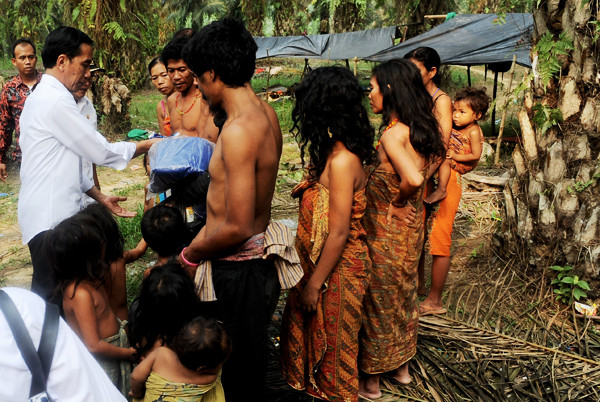Popular Reads
Top Results
Can't find what you're looking for?
View all search resultsPopular Reads
Top Results
Can't find what you're looking for?
View all search resultsThe last forest, the last indigenous peoples and COVID-19
We may not be able to completely emulate the way of life of indigenous peoples, which is in harmony with nature, but we certainly can be inspired by them.
Change text size
Gift Premium Articles
to Anyone
A
few days ago I was doing my routine morning walk when I came across a very upsetting scene. In one of the parks in my housing complex I came across a slaughter site.
No, not of humans or animals but of trees. However, it was no less horrifying for me. There were many trees in that park but my favorite was a big flamboyant tree with a trunk so wide were I to hug it, my arms could only reach half way.
But that morning, my beautiful, majestic tree was no longer standing. It had been felled and cut into pieces, like a dismembered human body with sawdust scattered around it akin to splattered blood stains. I was so upset, when I got home I was sobbing because I had lost a beloved friend.
I found out the next day that the reason for the cutting of my flamboyant tree as well as a few others was due to an infestation of termites in the park. How ironic that the huge powerful trees could be destroyed by these tiny insects. But then, humans, the world order and our “normal” way of life is being made decidedly abnormal, by the invisible COVID-19 virus, so size really does not matter.
The emotions I had about the trees in my park made me think of the fate of many indigenous peoples who depend on the forest. If I felt that upset about my flamboyant tree being cut down, imagine how devastated they would feel, especially with massive deforestation, losing their livelihood and their ancestral home.
As if on cue, around the time of my tree disaster, I received a book called Menjaga Rimba Terakhir (Safeguarding the Last Forest), written by the incomparable Mardiyah Chamim who takes on giants. What synchronicity!
Aug. 9 was International Day of the World’s Indigenous People. Just eight days after that was Aug. 17, Indonesia’s 75th independence day. My last column two weeks ago bore the title “Independence for the Nation, independence for women?” The title of this column today could also be the same: Do the indigenous peoples of Indonesia, the custodians of the forest, the ones who have lived in the archipelago since probably time immemorial, are they independent? Sadly, Mardiyah’s book suggests that they are not.
I first met Diyah, as she is affectionately called, at an antitobacco campaign. She had written a book called A Giant Pack of Lies, published in 2010, which took on Big Tobacco and “investigated the tobacco industry’s unethical practices in Indonesia through their own documents”.
Her new forest book was about the struggle of the Suku Orang Rimba (People of the Jungle), sometimes also known as Suku Anak Dalam (Hinterland Tribe). It’s often abbreviated as SAD, the meaning of which in English is so appropriate as it describes the fate of indigenous people worldwide who are increasingly displaced from their own lands by the interests (read: greed) of corporations. Ironically, but predictably, the state tends to defend corporations. By defending the Suku Orang Rimba, Diyah is taking on giants: Not just timber and palm oil companies, but the entire system of financiers, industries and multinational corporations, traders and retailers worldwide that support our “modern” consumeristic life.
A recent example was the criminalization and capture of Effendi Buhing, the head of the Kinipans, a group of indigenous people in Central Kalimantan, which environment activists accused as being “the state legalization of the robbery of customary land in the Jokowi era”.
On Aug. 26, Buhing was arrested by security forces at his house, allegedly for committing theft, coercion and robbery. In fact he and his friends were attempting to defend themselves because their forest was cut down to be converted into palm oil plantations.
Ironically, this act of violence happened just days after President Joko “Jokowi” Widodo wore traditional clothes from East Nusa Tenggara on Indonesia’s 75th Independence Day, symbolizing his support of local culture. Well, Pak Jokowi, mere symbolism doesn’t cut it!
But back to Mardiyah’s book. It’s solid, not just because of its thickness (580 pages) but also its content. Based on two years of research, both library and field research, it’s a personal adventure as well as a grounded piece of journalistic work (unsurprisingly given her background as a journalist). It’s comprehensive, covering the views of indigenous people, government officials, as well as environmentalists who have dedicated their lives to protecting the forest. Beautiful color photos are interspersed throughout the book. A real treat!
The book was published also as a documentation of three decades of Warung Informasi Konservasi (Information Center for Indonesian Conservation), or WARSI, a community of environmental activists founded on Dec. 27, 1991, in anticipation of their 30th anniversary in 2021.
The publication of the book in a time of the COVID-19 pandemic coincided with the theme of the International Indigenous People’s day: “COVID-19 and indigenous peoples’ resilience”. Indeed, the two are closely connected. We may not be able to completely emulate the way of life of indigenous peoples, which is in harmony with nature, but we certainly can be inspired by them.
COVID-19 proves that humans are not the masters of the world as we like to think ourselves to be, and that “the balance of the ecosystem is the key to restrain the rate of mutation of deadly viruses”. So, start balancing folks!










